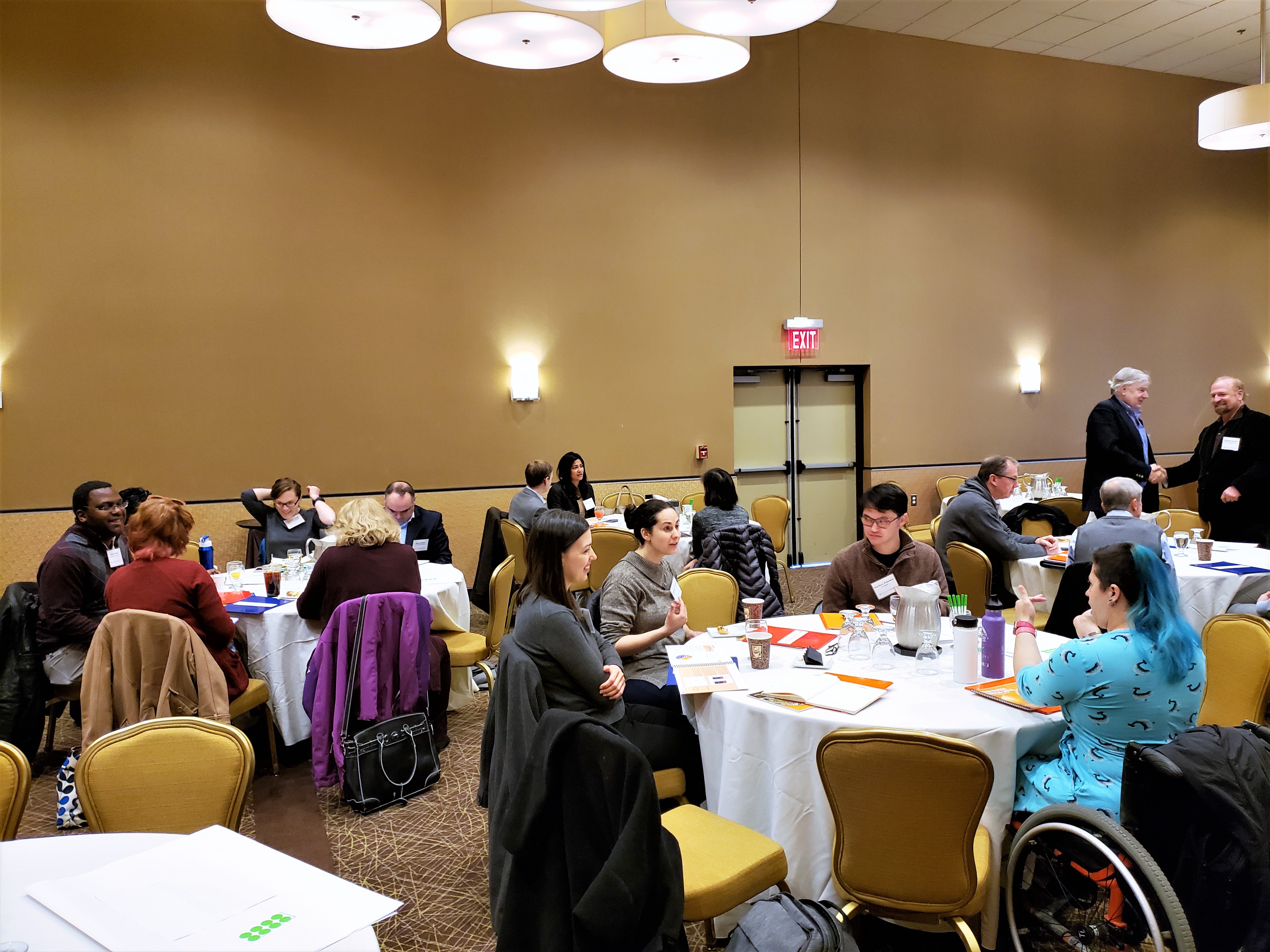
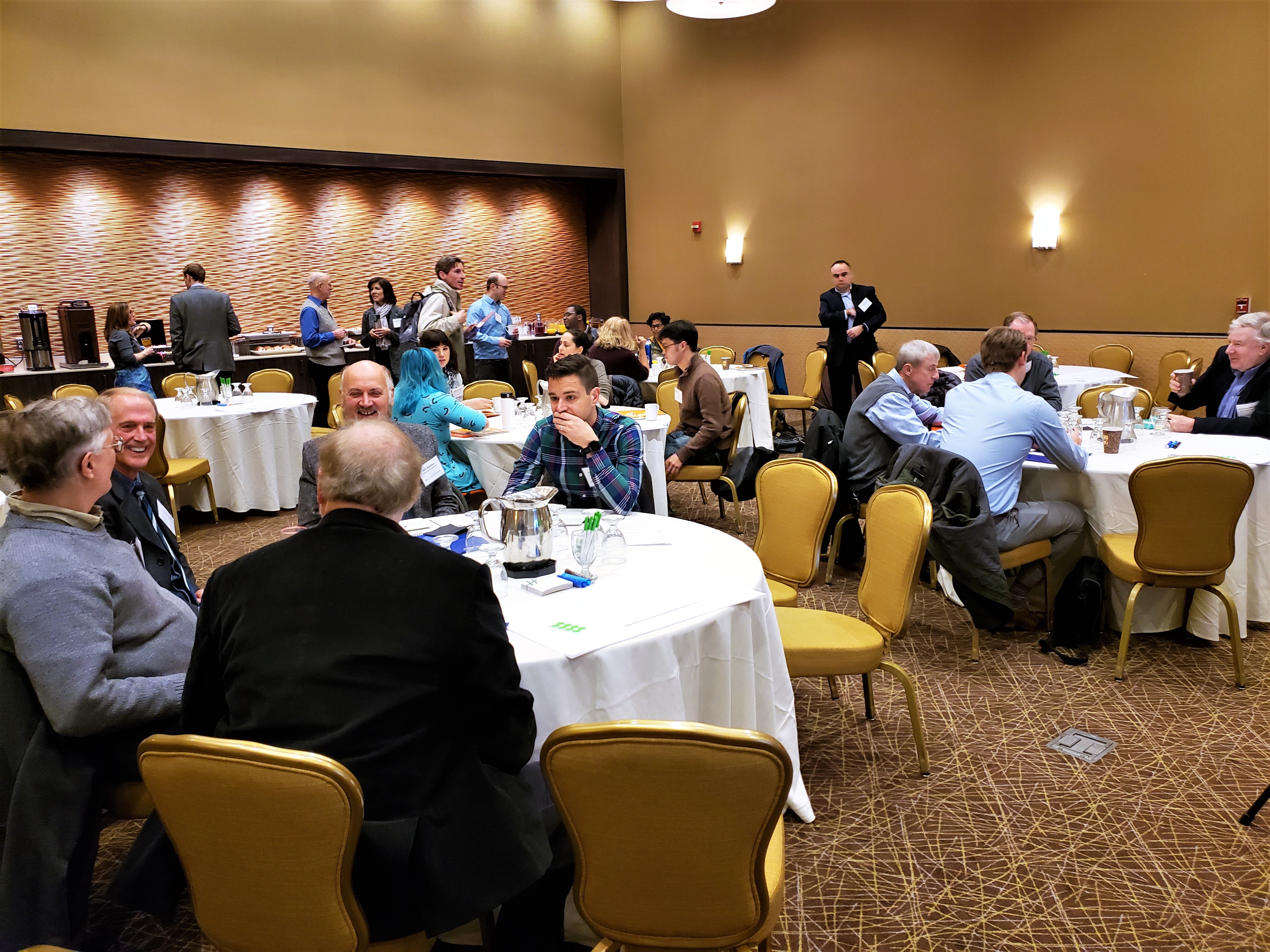
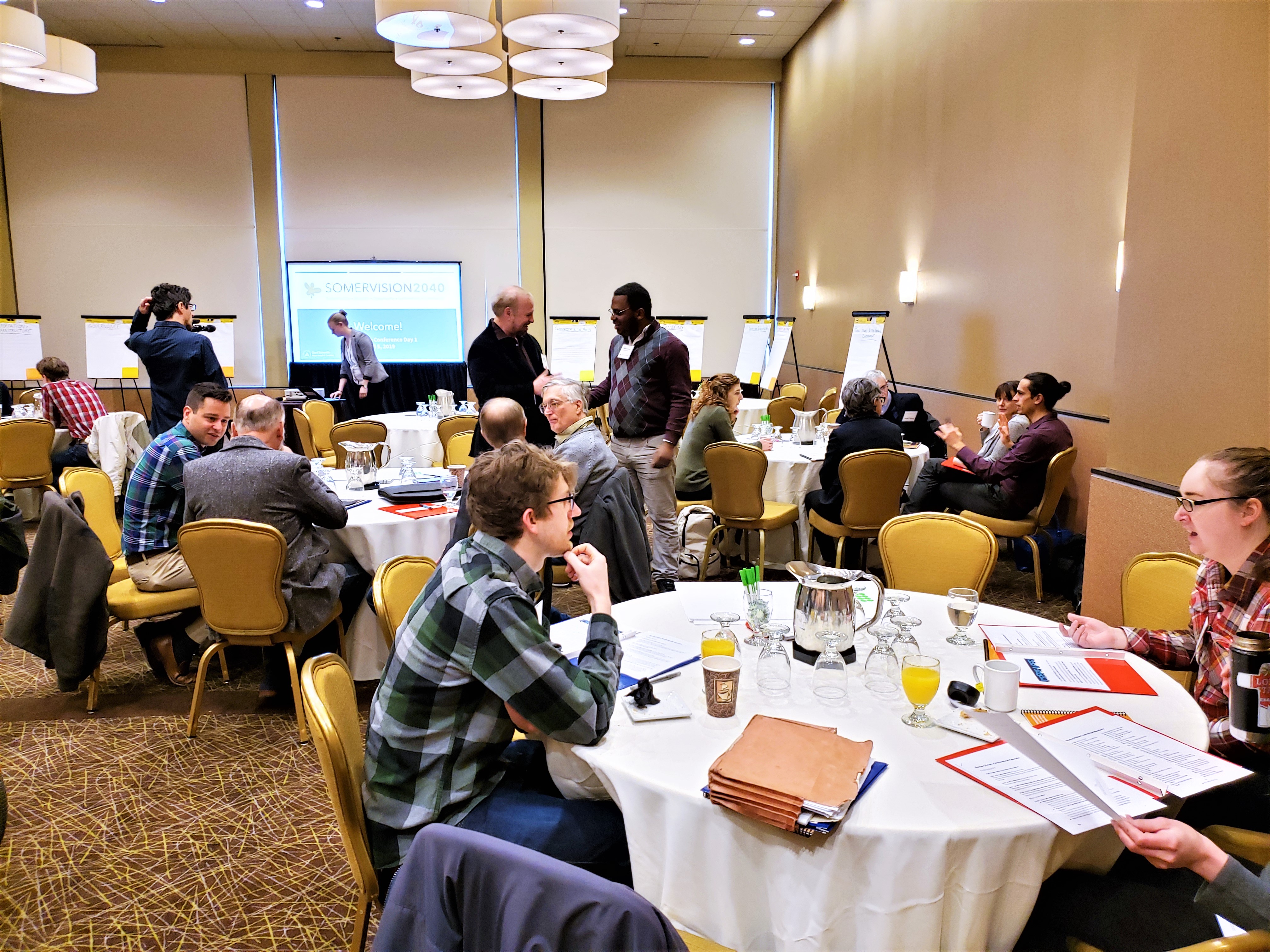
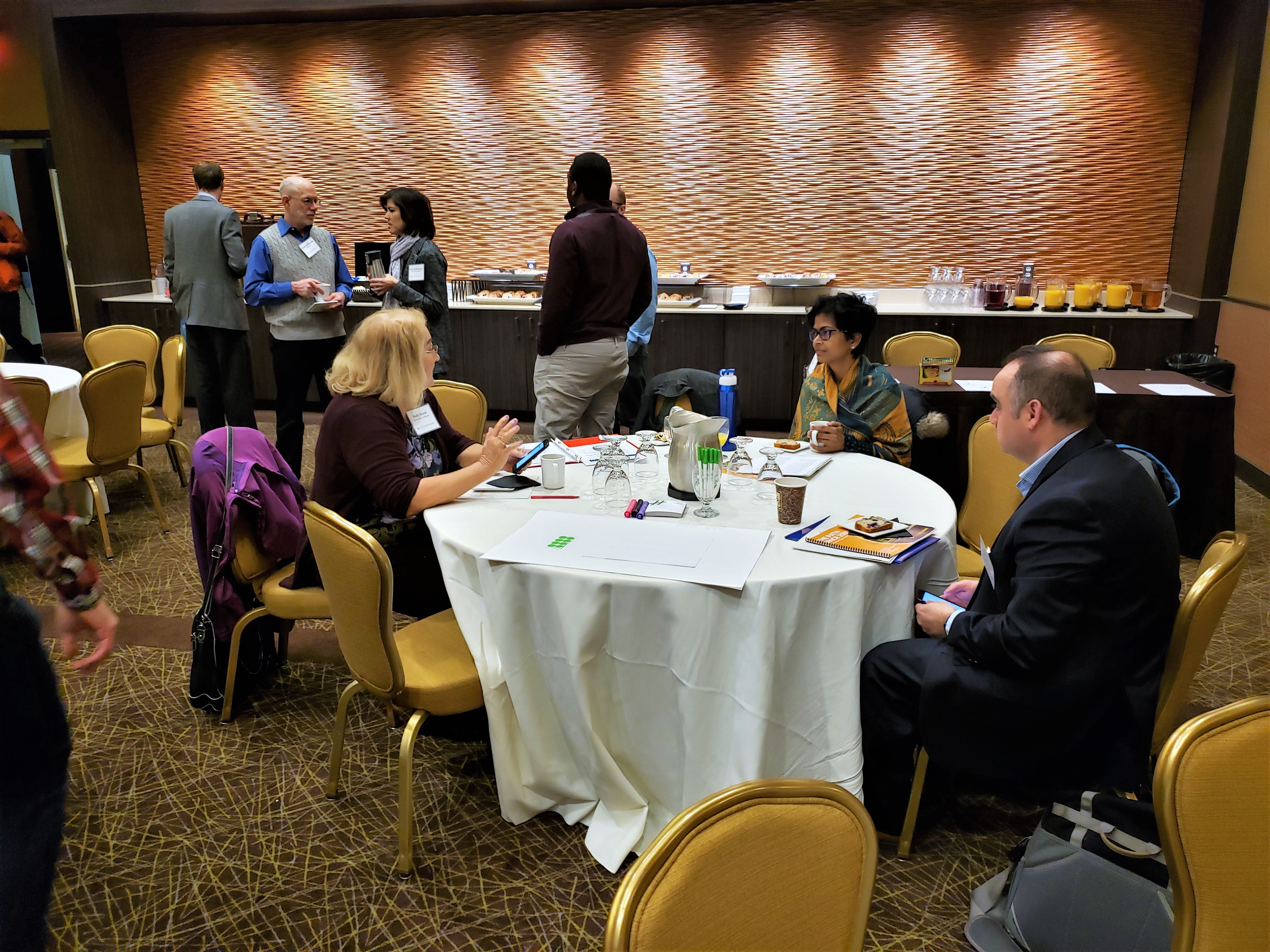
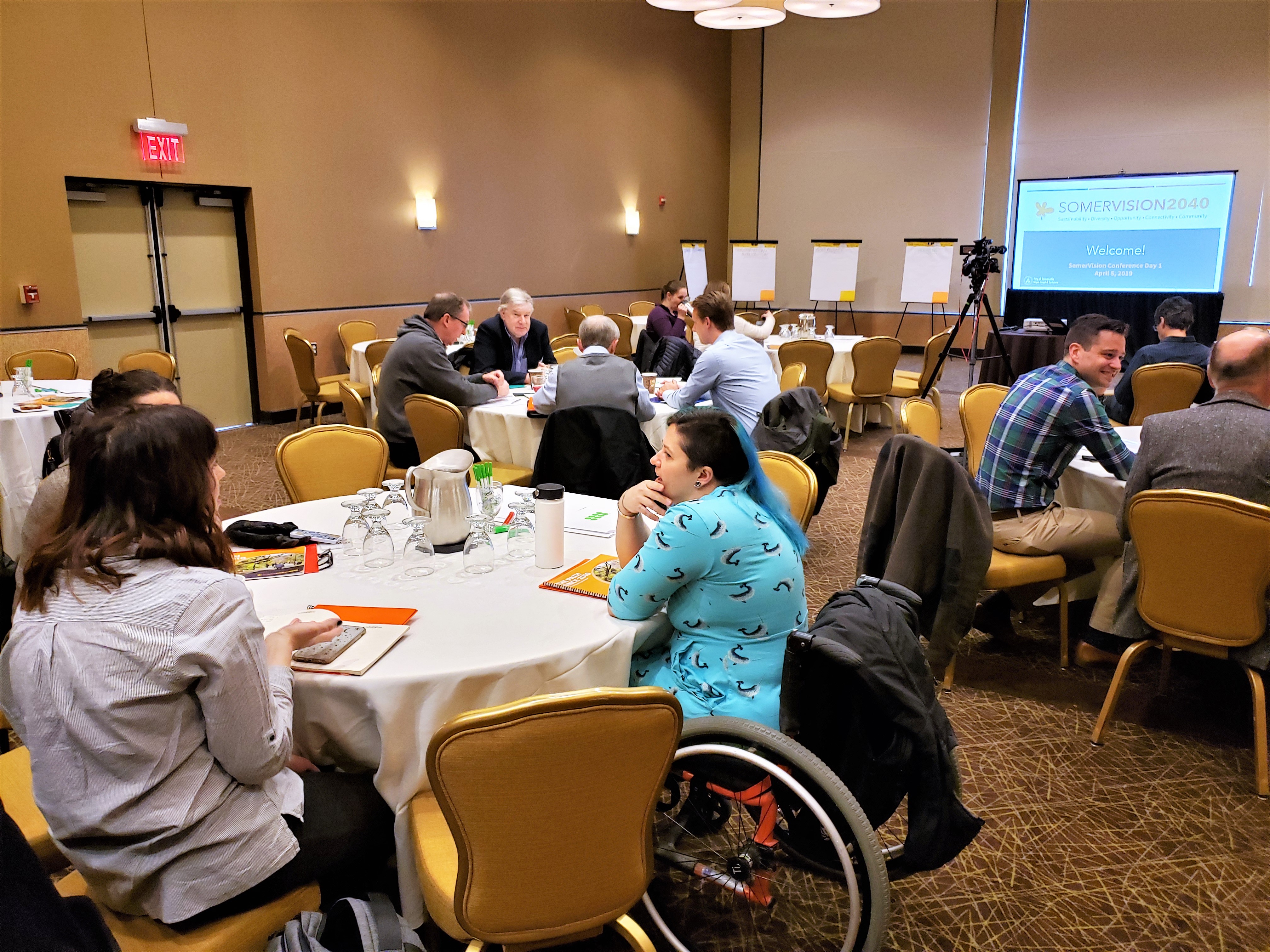
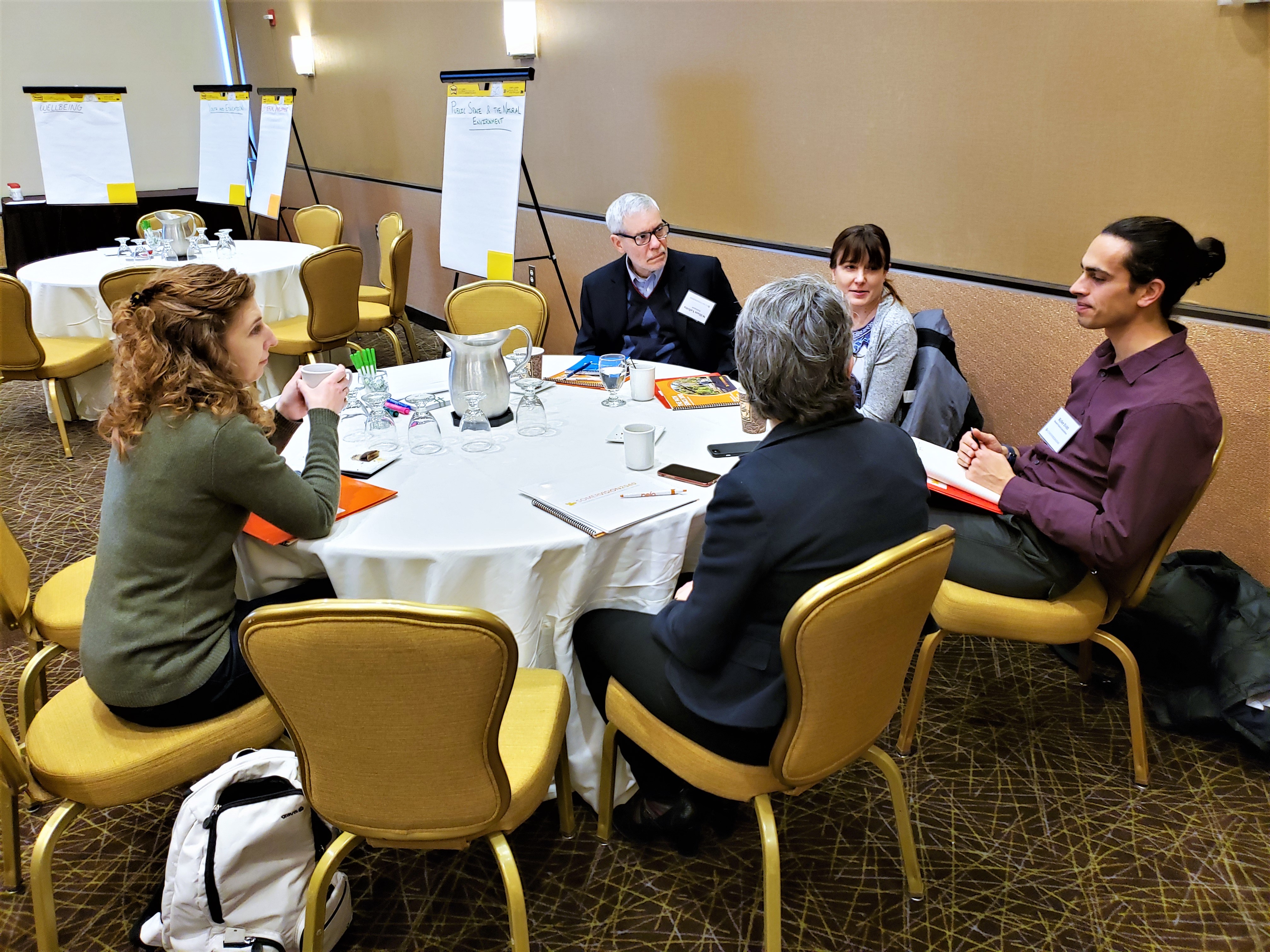
On Friday, April 5, through Saturday, April 6th, 2019, we hosted our SomerVision Conference at the Holiday Inn in Somerville. The event was open to the wider community but specifically focused on our SomerVision Committee members. The purpose was to review some important content, give participants the opportunity to learn more about relevant topics, and start getting to work on the chapter topics.
We had over seventy people participate throughout the two days and received invaluable feedback about the process, SomerVision, and our community in general. Below is the list of sessions and activities from the event.
Full group presentations and activities
Economic Development Planner Lauren Drago provided a quick overview of the SomerVision process, conference goals, and other basic information about SomerVision 2040.
Planning and Development Outreach Coordinator Victor Nascimento lead a session reintroducing our shared values as captured in SomerVision 2030 and covering two activities on equity, implicit bias, and how to consider these factors in policy making.
Office of Strategic Planning and Community Development Executive Director George Proakis highlighted how law, money, and land limitations impact planning and development in Somerville.
Director of Planning Sarah Lewis discussed how the Zoning Overhaul affects SomerVision goals and introduce a new framework for thinking about the many squares and neighborhoods of Somerville and took questions.
This session proposed new SomerVision Numbers based on those included in SomerVision 2030. We encourage you to watch the video rather than just download the slides for this session, as we decided not to pursue the planned activity but rather discuss the SomerVision Numbers more broadly. Participants highlighted the importance of setting a vision and selecting goals to support that vision and identifying additional data and research to make good decisions about the numerical goals.
Attendees wrote notes to brainstorm ideas on topics that will be further explored the SomerVision Committee working groups.
Brainstorming Boards (text transcribed below)
Transportation & Infrastructure
- Some area estimates indicate 30% of morning traffic is school traffic. Can we better leverage school buses? E.g. let Capuano parents put kids in Unidos buses.
- The parking in Somerville is too cheap. People use parked cars as storage. Incentivizes car ownership.
- Focus on neighborhood schools in student assignment model to support integration, neighborhood ties and save $.
- Close some streets to cards and have buses only instead (like in the 1920’s).
- More reliable bus schedules, they are often late (even with tracking app).
- Better bus schedules so you don’t have 4 empty buses following each other. Better coordination between schedules and traffic flow (coordinate lights, etc.)
- 90% of jobs and housing accessible by low-stress bike network.
- Plan for a NETWORK of protected bike lanes, not just individual streets.
- Publicize how people can/should report pain points (esp. with bike lanes/turns).
- Address rideshare apps like Lyft + Uber. Additional taxes, pick-up zones, how they contribute to traffic congestion… Be in open to innovations in transportation and make infrastructure malleable.
- Increase protected bike infra that attracts all ages; a “side effect” of biking for commute/pleasure is low-impact exercise.
Public Space & the Natural Environment
- Create an incentive/pilot to shift road space to open space
- More education about the existence of resources like pocket parks and protected bike paths. Helmet giveaways?
- Dedicate some open space for pollinator plants and milkweed for monarch conservation.
- Review previously underused and undervalued land like below I93.
- Consider allergies when planting or replanting trees and plants.
- Let’s come up with more useful metrics that measure the quality of access to, and diversity of our open space, rather than prioritizing the pure amount.
- Base developments open-space requirements on total build square feet instead of building footprints.
- Arrange access to parks in neighboring communities, maybe joint shutters supported by developers.
- 125 acres does not have to be binary; 50 acres by 2030 is still a win.
- 50 acres is not a win, progress yes.
- More community farms, not community gardens. Shared economy vs individual ownership. Conservation land trust to acquire more green space. Keep goal of 125.
- Create a Somerville open-space plan.
- Ensure privately owned public spaces are welcoming and easy to find. When developers use these to extract things that benefit their bottom line, we need to make sure they really look like public spaces otherwise the only one getting a benefit is the developer.
- Build open space over railroads and rights of way.
Governance
- Extend elder work to data gathering.
- Do more join projects with neighboring cities and minimize rivalries.
- Shift to a City manager.
- Web platforms for community input in between iterations of neighborhood plans.
- The 4th level of governance and neighborhood councils (CBAs)
Community & the Arts
- Commercial subsidizing local retail and art spaces, studios and galleries.
- Art spaces in banks, lobbies, underused spaces.
- How do we enhance a sense of community with large temporary/transient populations?
- Take inventory of what we have by use type: studios, maker space, arts education, etc. then define goals for preservation and or growth of each.
Youth & Education
- Ways to keep families with kids in Somerville – different community vision.
- Mental health services and awareness for youth.
- Mindfulness should be integrated into the daily school schedule.
- New YMCA or Recreation Center, much more spent on recreation.
- Traffic calming.
- Programs for tweens/teens.
- Create meals to home using school food that would be wasted and thrown away, see Indiana’s “cultivate” program.
- Give kids a voice and leadership role by intentionally plugging them into the climate revolution and training in the creative advocacy that will require.
- More recess.
- Non-abstinence based sex ed.
- Get rid of the common core curriculum.
- Transportation for student recreation/sports activities, etc. –- consider transportation for children too young to take public transit alone and with no guardian who can drive them.
- Coordinate notices through SHA and housing to encourage participation in school events and raise awareness.
Commercial Development and Jobs
- Establish a biotech cluster in Union Square.
- Leverage our competitive advantage.
- Quantify full range of benefits of commercial taxes (less residential taxes), jobs and economic development (foot traffic for local businesses).
- Residents don’t’ have to leave Somerville for work.
- To get 22.5k jobs we need 11.2 million sf retail or 4.5 million sf of office space or 9.9 million sf of lab space.
- What would 4.5 million sq of office look like? 4.5 million sf of office space? 9.9 million sf of lab space?
Housing
- Building enough homes for people to live in is more important than what the buildings look like
- Zoning changes for height increases provide more units. Consider the cause and effect of opposing or approving. Who is affected positively? Negatively? How?
- Understand that no amount of new Somerville housing will satisfy regional demand.
- There needs to be a city commitment of a specific number goal regarding affordable housing “XX units by 20XX”.
- 40 by 40: 40% deed restricted by 2040. 20% <80% AMI, 10% 80-110% AMI, 10% 110-150% AMI
- Proposal: 85% of Somerville is already residential. Require only affordable housing until jobs requirement is met.
- Consider 100% affordable overlay zoning like Cambridge is considering.
- Consider the diversity of housing stock – more 3-4 bedroom units for families.
- If you build more high-end housing, affordable housing can’t form communities. Build only affordable housing for about 5 years.
- Must find regional solutions! Otherwise, we end up solving neighbor’s housing shortages.
- Support/provide outreach on tenant rights for immigrant families. Protect against “force-outs” via non-repair.
- We can’t pay for affordable housing without building a lot more commercial development. We can’t build substantially more affordable housing by building more unaffordable housing and settling for crumbs.
- Why are we benchmarking ourselves off the proportion of regional housing we contributed in 2010? Perhaps Somerville was doing more than its share then.
- Support tenant organizing.
- Co-housing for older people and city help on accessibility.
- What would 11,000 housing units look like? 15,000 units? 18,000 units?
- Denser construction to support demand.
Climate and Sustainability
- Safe infrastructure for transit increases, pedestrian and bicycle use which in turn reduces traffic (carbon-intensive plus pollution). This is a public health and sustainability issue.
- Assess existing homes to evaluate where unhealthy degradation has occurred and created a supportive program to target, assist, upgrade. Too many homes are just not able to be maintained! They need help.
- An audit needs to be implemented that assesses heat island effects and determine ways for those found excessive to overcome that (i.e. large parking lots getting canopy cover for shading – impervious surfaces).
- Review projects in neighborhood context not just within property lines.
- Adopt and incentivize the passive house standard.
- Zoning Ordinance: Do not prioritize parking requirements over the landscape.
- Is there a lower parking requirement for zones near train stops in the new code?
- Take care of and monitor trees on private property as well as public spaces.
- Benchmark all buildings (with true blower door tests and utility data) to understand the EUI and develop a plan to upgrade systematically, focusing on the worst offenders first.
- Composting as a city service?
- More trees and better public transit.
- We need to find any and all means to steer building and transit to zero carbon (i.e. 100% renewable energy). Both new and existing.
- Implement tax incentives for sustainable and resilient commercial and residential new development and renovation of existing buildings.
- Lead by example – residents should retrofit their homes and demonstrate the benefits. Precedents are key to systemic change. Host building tours of retrofitted buildings and the real experience will make it tangible to others.
Breakout Sessions: Participants were given the opportunity to pick up to 3 sessions to attend
SomerVision 2030 set an ambitious goal of 125 acres of new publicly accessible open space. Landscape Designer Luisa Oliveira and Community Preservation Act Manager Kristen Stelljes led a conversation about what makes quality open space and how to achieve it in Somerville’s future open space projects.
The implementation priorities and goals set out in SomerVision require significant investment by the City. Somerville Budget Manager Michael Mastrobuoni led a conversation about the fundamentals of municipal finance and how City revenue can help achieve SomerVision’s housing, jobs, open space, and transportation targets.
Somerville Public Schools recently completed the Somerville Learning 2030 visioning process, which identified the values and needs of students, parents, and community members around education and youth. SPS Chief of Staff Jeff Curley and Superintendent Fellow Jessica Davis led a conversation around the Somerville Learning findings and how the next phase of the Somerville Learning process and Somervision 2040 will work together.
Attracting new development in Somerville is key to achieving the SomerVision Numbers. Director of Economic Development Tom Galligani led a conversation on the development process, including financing, community benefits, and the importance of commercial development.
Somerville established the Office of Housing Stability (OHS) in 2018 as part of the Mayor’s Affordable Housing Agenda. OHS Director Ellen Shachter, along with the Director and Assistant Director of Housing, Michael Feloney and Kelly Donato, led a conversation on Somerville’s housing strategy, including what the City is currently doing, what’s next, and the ideas in consideration.
Somerville launched Climate Forward, Somerville’s first comprehensive climate change plan, in 2018. Director of the Office of Sustainability and Environment Oliver Sellers-Garcia and Sustainability Coordinator Hannah Payne led a conversation on how SomerVision 2040 can complement the action items set out in Climate Forward to reduce Somerville’s contribution to climate change and prepare the City for the unavoidable impacts of climate change.
With the housing production and commercial development called for in SomerVision, it is crucial to ensure that our city doesn’t become crippled with traffic congestion. Director of Transportation and Infrastructure Brad Rawson led a conversation on how Somerville can make it easier for residents to use sustainable transit modes.
Greater Boston’s regional planning agency, the Metropolitan Area Planning Council (MAPC), is in the process of developing MetroCommon 2050, the region’s long-range plan. Christian Brandt, Community Engagement Coordinator at MAPC, led a discussion about MetroCommon and MAPC’s research on local planning issues.
Director and Deputy Director of Health and Human Services Doug Kress and Nancy Bacci, along with Shape Up Somerville Director Lisa Robinson led a conversation on health and wellbeing in the Somerville community, and how these topics connect to SomerVision priorities.


